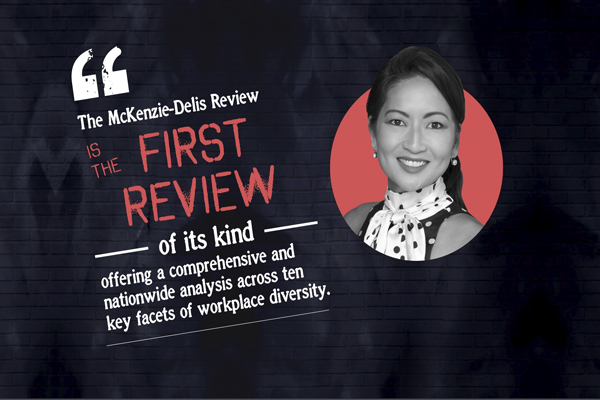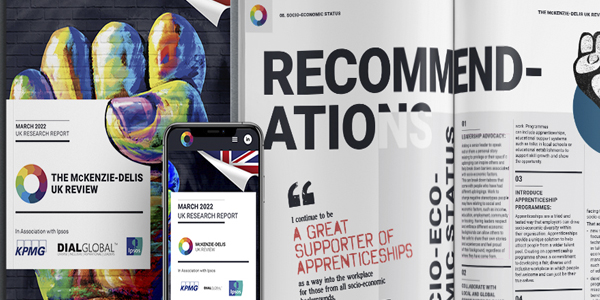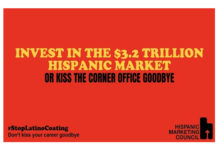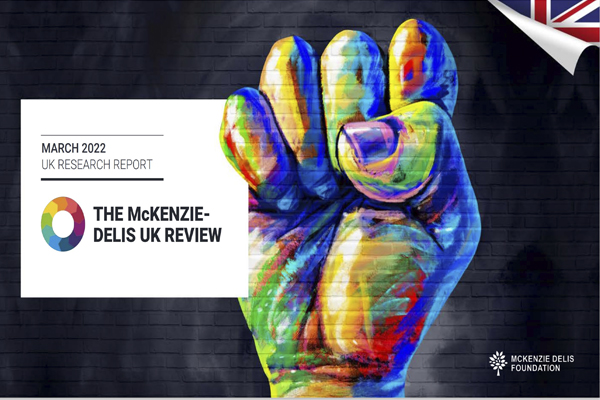Although the UK’s biggest companies are increasing their focus on workforce diversity and inclusion, many have barely begun to embed real change on areas such as race, sexual orientation and disability, confirmed the latest McKenzie-Delis Review.
The report found that very few businesses have LGBTQ+ and ethnic minority representation on their leadership team; and companies are still struggling to increase the representation of those living with disabilities. In fact, only a quarter of businesses have LGBTQ+ representation on their leadership team; while two-fifths of leadership teams have no ethnic minority representation whatsoever. Furthermore, only one in three businesses are actively looking to promote or hire staff with disabilities.
This year’s review showed some encouraging aspects, revealing that UK plc is making D&I progress; but “when you break down each of the 10 facets, it’s clear that there is still a long way to go,” stated Leila McKenzie-Delis, CEO of D&I accelerator DIAL Global and Founder of the McKenzie-Delis Foundation; a charity committed to driving research and insight into workplace equality. “Firms are beginning to see that tracking and measuring D&I seriously, as they do every other aspect of their business, is imperative to ensuring strong business performance.”
DIVERSITY BLIND SPOTS
Although some companies are doing good things and committed to measuring their progress, others simply “haven’t done enough or even scratched the surface; particularly those businesses that still do not measure all the facets of D&I,” she added. “Let us be in no doubt. The UK’s biggest companies have a responsibility to lead by example; and we need to see more organisations blazing a trail to move the dial and lead the way. It’s an ongoing challenge, but one we are determined to tackle.”
The results of the McKenzie-Delis Review show that “even those businesses thinking about diversity have blind spots,” added Ben Page, Co-chair of the McKenzie-Delis Review and CEO at IPSOS. “The fact that legally mandated aspects of diversity like gender and disability get much more attention than areas like age and social background is a reminder that even the most progressive businesses need to keep flexing what they do and being creative.”

DIVERSITY & INCLUSION CHALLENGES
First launched in 2020, this year’s review sheds light on the complex challenges facing employers post-pandemic. Encouragingly, the business case for D&I is recognised as being stronger than ever; with companies starting to actively track their progress to demonstrate if, and how, they are embedding change.
The annual review conducted in partnership with IPSOS, and supported by KPMG, measured 10 facets of workplace D&I beyond gender and ethnicity; helping companies assess sexual orientation, disability, age, religion, nationality, socioeconomic status, mental health and wellbeing, and parenthood.
A total of 89 businesses participated in this year’s McKenzie-Delis Review, making it the largest yet. Unilever, Diageo, Royal Mail, Boots, Co-op, Page Group, Marks & Spencer, Jaguar Land Rover, Network Rail, Britvic, O2 Virgin, Superdrug, Tate & Lyle and The FA, were just some among those that took part. The 10 facets were ranked in order of how well they were monitored and addressed by UK firms; with nationality, religion, and mental health and wellbeing scoring highly.
KEY DIVERSITY & FINDINGS
Other key findings in the report include:
- Mental health and wellbeing was ranked the top facet, with the survey finding four in five had a relevant strategy in place; and 93% were keen to support employees with access to quality care.
- Among the lowest-ranked facets for UK employers was sexual orientation; rated tenth and even considered by some companies to still be a “taboo topic”. The report found that currently, a quarter of firms have LGBTQ+ representation on their leadership team; with less than 40% having approved an LGBTQ+ strategy in the past 12 months. A total of 37% of firms did not know if they had a member of the LGBTQ+ community in their senior leadership team.
- The key findings also included how one in three firms were actively looking to promote or hire staff with disabilities. It highlighted businesses’ “lack of understanding and appreciation of the unique skillset and experiences people with disabilities bring to the organisation”.
- On race, the report found that companies had generally performed poorly relative to other facets. Leadership teams and boards are still predominantly white, with two fifths having no ethnic minority representation whatsoever; and where there is ethnic minority diversity at the top, just 14% of senior leaders and 21% of board members are from an ethnic minority background.
STRENGTHENING DIVERSITY INITIATIVES
The report concluded that D&I is clearly on the agenda, but it is important that work continues and expands. Despite the best intentions of CEOs, there is “no evidence that [current] diversity initiatives will change the face of leadership”, noted the research.
The study made various recommendations to businesses under each of the 10 facets on best practices and how to strengthen diversity in the workforce. Among them were reviewing talent pipelines; helping businesses end racism in the workplace; providing year-round support for the LGBTQ+ community; and creating a disability employee resource group championed by a senior executive.

BETTER BUSINESS RESULTS
Commenting on the report findings, Bina Mehta, Co-chair of the McKenzie-Delis Review, and Chair of KPMG in the UK said:”Organisations that place inclusion, diversity and equity at the heart of their business strategy have a competitive advantage. They benefit from fresh thinking and different perspectives, which ultimately translates into better business outcomes; it’s good for business and it’s good for society.”
The McKenzie-Delis Review “takes a much-needed holistic approach to inclusion, diversity and equity, placing a spotlight on the many facets of diversity; not just gender or ethnicity”, she added. “The collection of quality workforce data may reveal uncomfortable truths; but it’s the critical first step towards turning the dial on diversity. It’s only by embracing the uniqueness which comes from experience and background that open and inclusive cultures can truly become a reality.”
The pandemic “created some of the bravest, most profound, and uncomfortable conversations our society has ever had; and changed everything, with big businesses starting to ask searching questions about D&I”, added Lord Simon Woolley; Co-chair of the McKenzie-Delis Review and Principal at Homerton College, Cambridge University. “But there is so much more that needs to be done. While the report shows companies are beginning to build ethnicity and gender into their leadership teams and succession plans and mental health and wellbeing is now firmly on their agenda, there is still a long way to go to address inequalities in our schools, businesses, and communities. I urge all leaders to read, digest and take note of the best practice outlined in the report to adapt for your own workplaces today.”
The full report can be viewed here.




































